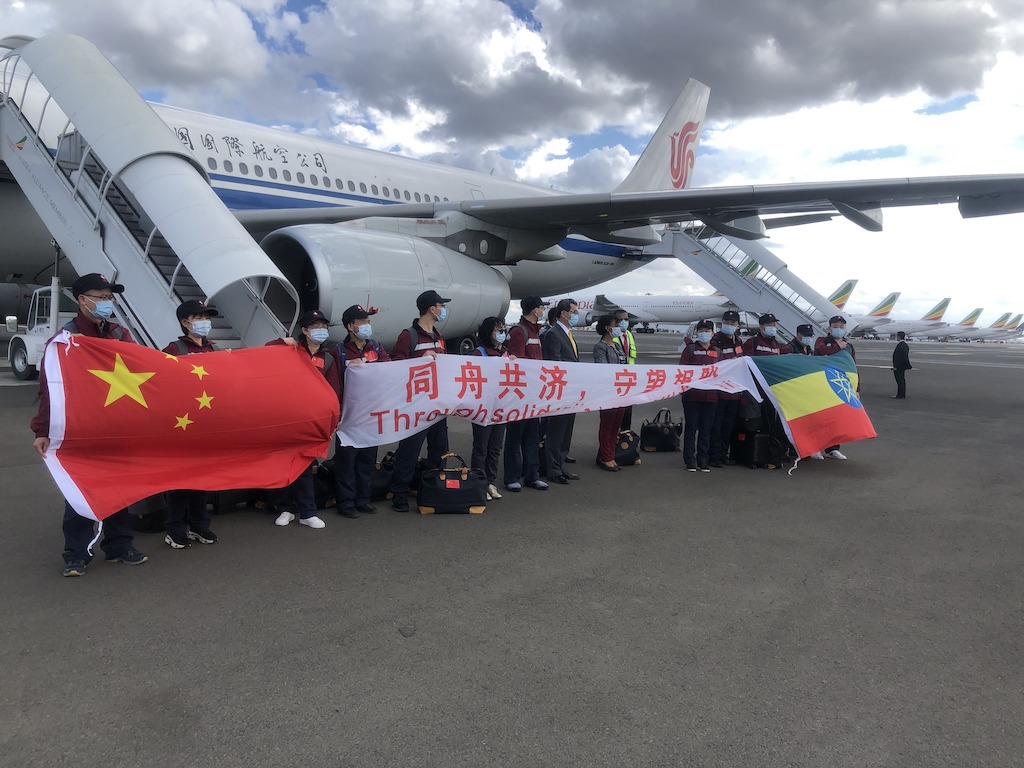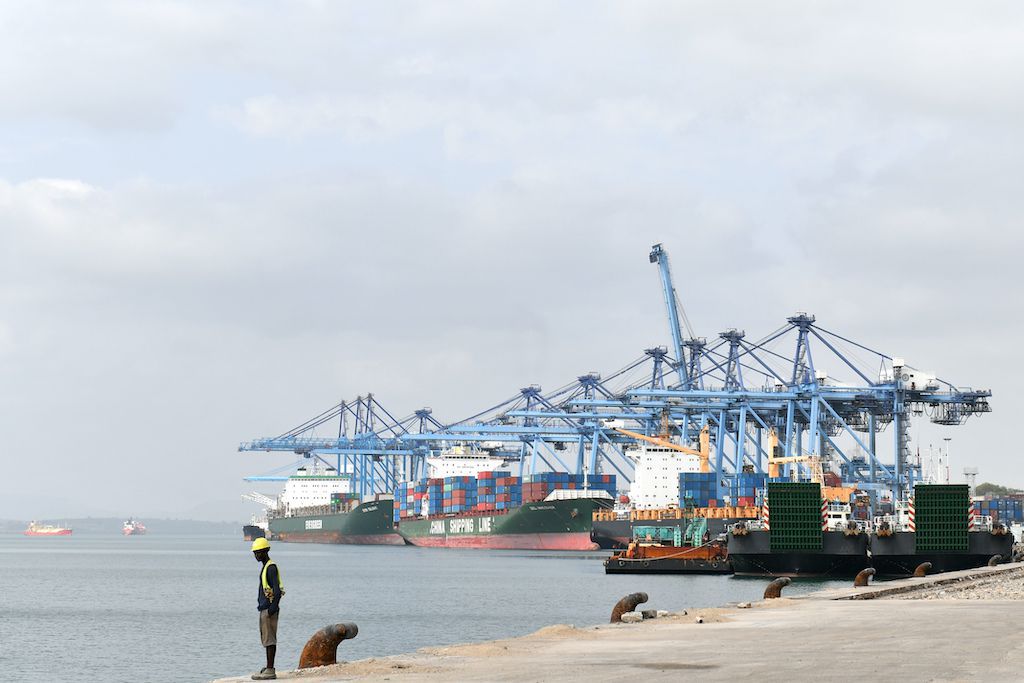Africa-China relations under stress
The pandemic-induced economic contraction put Africa in a vulnerable position. Youthful sub-Saharan countries in Africa got off lightly, but unless there is an effective recovery, they face devastating economic blows, insolvency and, most likely, political instability.

In a nutshell
- Africa experienced dramatic economic consequences of the pandemic even before its first coronavirus cases
- The continent has been highly dependent on China’s commodities imports and overseas investment projects
- Its short- and medium-term outlook is bleak unless there is a quick and robust global recovery
The evolution in relations between Beijing and African states will have a critical impact on the continent’s future. The latest disruption, the coronavirus pandemic of 2020 and the freeze it has triggered in all key economies, will most likely accelerate the preexisting trends rather than generate new balances of power.
Specifically, two factors will significantly influence Africa’s future. The first is China’s ability and willingness to continue overseas investments. China’s President Xi Jinping is facing a daunting economic challenge, probably the hardest on his watch. According to the National Bureau of Statistics of China, the country’s gross domestic product (GDP) fell 6.8 percent in the first quarter of 2020 compared to the first quarter of 2019, making it the worst economic contraction in half a century. However, while the 2019 growth rate of 6.1 percent was the lowest since 1990, it has kept the ruling Communist Party of China on track to fulfill its promise to double the country’s 2010 GDP and increase per-capita income to $10,000 by 2021 – the party’s centennial anniversary.
Secondly, while in Africa the public health impact of the pandemic has been mitigated by the youthfulness and low density of its population, and probably favorable climate conditions, the economic impact of this global disruption will most likely be devastating and long-lasting.
China’s largesse
Two decades ago, Beijing’s “go out and buy” policy was focused on the acquisition of crude oil and raw materials needed for the country’s industrial expansion, and pushing its One-China policy principle in the international arena. Today, China is Africa’s biggest trade partner, top creditor and primary source of infrastructure financing.
In 2019, more than half of the 46 existing and planned port projects in West Africa were financed by China
Foreign direct investment (FDI) in Africa increased rapidly over the last decade. Beijing’s Belt and Road Initiative or BRI, has been enshrined in the Chinese Communist Party’s charter and now serves as President Xi’s blueprint for expanding the Middle Kingdom’s economic, political, security and cultural reach far outside its borders.
Africa plays an essential role in the BRI. The Maritime Silk Road Initiative (MSRI) aims to secure China’s access to sea lanes, ports and supply chains at a time of heightening competition in Southeast Asia and the Indian Ocean. Nearly 40 African states and the African Union have signed onto the BRI project. Due to their strategic location for maritime trade, such countries as Ethiopia, Sudan, Djibouti and Kenya have assumed a prominent role in the MSRI. Their alliance with Beijing has led to significant infrastructure projects largely financed by Beijing and constructed by Chinese firms, such as the standard-gauge railway (SGR) between Mombasa and Nairobi, the Addis Ababa-Djibouti Railway, or the takeover, by China Merchants Port Holdings, of operations at Djibouti’s Doraleh Container Terminal.

The MSRI is also expanding its footprint on the Atlantic side of the continent: in 2019, more than half of the 46 existing and planned port projects in West Africa were financed by China.
The pandemic’s impact
African countries felt the consequences of production shutdowns and supply-chain disruptions even before they registered their first Covid-19 cases. China’s imports declined sharply as the global demand for raw materials and commodities collapsed. After the first cases in Africa were diagnosed, lockdowns were adopted throughout the continent.
African countries are particularly vulnerable to the short- and long-term effects of the pandemic, the lockdown measures in particular. In a region where a substantial part of the population depends on the informal economy and savings rates are low, lockdown measures immediately undermine food security. The oil-exporting economies like Nigeria, Gabon or Equatorial Guinea are hurting badly from the crash in the commodity’s prices. Africa’s oil-dependent economies caught by the pandemic while undergoing structural reforms – for example, Angola, which had been using its crude as collateral for Chinese lending – find themselves in a particularly dramatic situation.
The IMF slashed its GDP growth forecast for Ethiopia, for example, from 6.2 percent before the crisis to 3.2 percent now.
Also, for Kenya, Tanzania, South Africa and Rwanda, where tourism had been a vital revenue-earner and source of employment, the road to recovery will be long and tortuous even under the best-case scenarios.
The International Monetary Fund expects sub-Saharan Africa’s economy to contract by 1.6 percent, the region’s worst performance since 1970. The IMF slashed its GDP growth forecast for Ethiopia, for example, from 6.2 percent before the crisis to 3.2 percent now. Given sub-Saharan Africa’s indebtedness (which has increased to almost 60 percent of GDP over the last decade), the fast-growing population and high poverty rates, the consequences of economic contraction on this scale can be disastrous. Its medium- and long-term impact on the continent’s stability, security and humanitarian situation is of particular concern.
Diplomacy and humiliation
When Beijing faced harsh international criticism for its role in the spread of Covid-19 and found itself under unrelenting pressure from Washington, it launched an intense diplomatic campaign, at both the bilateral and multilateral levels. China also wasted no time reaching out to the pandemic’s victims, providing equipment and expertise throughout the world and exploiting the leadership void left by the U.S. and Europe.
Beijing also supplied African countries with much-needed medical supplies, equipment and expertise. Chinese companies rushed to upgrade hospitals and raise quarantine centers in a continent where health diplomacy has a long tradition. However, Africans experienced firsthand the downsides of China’s efficiency in containing Covid-19, when the authorities in Guangzhou identified the continent as the primary source of imported cases.
African citizens were subjected to mandatory tests, passport seizures and were banned from entering hotels and restaurants. African ambassadors reacted promptly, writing a joint letter to China’s Communist Party and to the foreign affairs ministry. They also reported the abuses to the United Nations Human Rights Council. While this episode confirms the increasing agency of African leaders, in practice, the countries are stuck between a rock and a hard place. At a time of health risk and financial urgency, they can ill afford to confront their biggest creditor.
Debt diplomacy
Despite Beijing’s propaganda, Sino-African relations generate mixed feelings in Africa. Concerns have increased in recent years as land grabs, debt sustainability, human rights abuses and climate-change mitigation weigh on political agendas in several countries. A recurrent criticism of China’s cooperation model is that Beijing burdens its African partner countries with high-interest loans backed with collateral, which can lead them into debt traps.
To mitigate the pandemic’s economic impact, in March 2020 African finance ministers called for a $100 billion stimulus package for the continent’s economies, including $44 billion in the suspension of bilateral, multilateral and commercial debt service payments. In the month that followed, the G20 (an international forum for governments and central banks of 19 countries plus the European Union) agreed to suspend debt service payments for the poorest countries, including several African states.
In this context, the decisions of China, the world’s largest bilateral creditor and the biggest single lender to Africa (according to the China Africa Research Initiative, between 2000 and 2018, the Chinese government and the China Development Bank lent more than $150 billion to African countries), will have a major impact on Africa’s financial and economic outlook. The continent’s most debt-distressed countries such as Gambia, Zimbabwe, South Sudan and the Congo, are wary of Beijing’s next moves.
Scenarios
The evolution of Sino-African relations will be defined, first and foremost, by China’s path of economic recovery. Whereas in the medium to long term, Africa will remain relevant for China due to a combination of demographic, geopolitical and economic considerations, the political consequences of a slow recovery could force Beijing to restrict its overseas ambitions. In this context, three scenarios emerge.
Cautious continuity
Under this more likely scenario, the pandemic will serve as an accelerator of previous trends. China will cling to its global strategy and Africa will remain a vital part of it. However, due to the persistent domestic and regional resistance, international criticism and tighter financial limitations, Beijing will become more restrained in its loan and debt diplomacy in Africa. Less economically viable projects will meet rejection and debt renegotiations, if they take place, will be conducted bilaterally, not in multilateral formats. This new approach was already evident at the 2018 Forum on Africa-China Cooperation when, in contrast to the previous summits, Beijing abstained from doubling or tripling its financial pledges.
While some African leaders will continue to see Beijing as a financial lifeline and the Chinese experience as a viable model of growth and development, Sino-African relations will be affected by any confirmation of the “debt trap” theory. If BRI partner governments are forced to cede control of strategic infrastructure for arrears on Chinese loans, China’s leverage in the continent will suffer irreparable damage.
Asia-centered Africa
Under this slightly less likely, scenario, China’s leverage in Africa will rise substantially. This presumes that China leads a global economic recovery with a V-shaped rebound, which prevents internal threats to the communist party’s power and allows President Xi to focus on his international strategy. In the meantime, the rest of the world would still be struggling with the immediate effects of the pandemic.
This rapid normalization could result from China’s competitive advantages. As the pandemic’s epicenter, the country is a step ahead of the West in managing it. Also, for all its growing sophistication, China’s economy remains more immune to the effects of shutdowns and social distancing than its Western counterparts. And given the illiberal nature of the Chinese regime, individuals and companies are more ready to adapt to virus control mechanisms while keeping economic activity.
Taking advantage of the U.S. strategic retreat (a trend likely to continue regardless of the outcome of the November presidential election) and the EU’s struggle to restore its cohesion, China maintains its diplomatic offensive under this scenario. It scales up expansive projects such as the Health Silk Road and the Digital Silk Road. As multilateral organizations, including the World Health Organization, come out of this crisis undermined or discredited, Beijing may seek to strengthen its role in them through lobbying and financial contributions.
Investing in soft power, and as Africa’s main creditor, China could demonstrate some financial flexibility in debt-reduction negotiations. At the same time, it could remain a vital financer by engaging with international financial institutions and the private sector.
Discontinuity
Under the least likely script, China would scale down its global ambitions and turn inward. This scenario sees President Xi’s hegemonic ambitions buried. A painfully slow recovery from the pandemic crisis and massive unemployment would shatter the communist party’s authority among the population and diminish its power. The BRI, put in motion in 2013 when China’s growth rate was close to 8 percent, would be downsized under adverse circumstances.
For Africa, this all would be bad news. The continent’s economic integration process, based on big transportation development projects in regional corridors, would at least be suspended. As a significant number of African economies are dependent on exports to China, including Angola, Nigeria, South Africa, Congo and Gabon, the downturn would be severe. The heavily indebted BRI countries like Zambia and Mozambique would also be cornered. Beijing’s disengagement would likely lead, in the medium term, to stronger partnerships between Africa and the U.S. and Europe, with projects going beyond aid and security.







